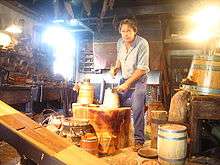Cooper (profession)




A cooper is someone in the trade of making utensils, casks, drums and barrels and other accessories, usually out of wood, but sometimes using other materials.
History
Traditionally, a cooper is someone who makes wooden, staved vessels, bound together with hoops and possessing flat ends or heads. Examples of a cooper's work include but are not limited to casks, barrels, buckets, tubs, butter churns, hogsheads, firkins, tierces, rundlets, puncheons, pipes, tuns, butts, pins and breakers. Traditionally, a hooper was the man who fitted the metal hoops around the barrels or buckets that the cooper had made, essentially an assistant to the cooper. The English name Hooper is derived from that profession. With time, many Coopers took on the role of the Hooper themselves.
The word is derived from Middle Dutch or Middle Low German kūper 'cooper' from kūpe 'cask', in turn from Latin cupa 'tun, barrel'.[1] Everything a cooper produces is referred to collectively as cooperage. A cask is any piece of cooperage containing a bouge, bilge, or bulge in the middle of the container. A barrel is a type of cask, so the terms "barrel-maker" and "barrel-making" refer to just one aspect of a cooper's work. The facility in which casks are made is also referred to as a cooperage.
There were four divisions in the cooper's craft. The "dry" or "slack" cooper made containers that would be used to ship dry goods such as cereals, nails, tobacco, fruits, and vegetables. The "dry-tight" cooper made casks designed to keep dry goods in and moisture out. Gunpowder and flour casks are examples of a dry-tight cooper's work. The "white" cooper made straight-staved containers like washtubs, buckets, and butter churns, which would hold water and other liquids but did not allow shipping of the liquids. Usually there was no bending of wood involved in white cooperage. The "wet" or "tight" cooper made casks for long-term storage and transportation of liquids that could even be under pressure, as with beer. The "general" cooper worked on ships, on the docks, and in warehouses, and was responsible for cargo while in storage or transit. With a specialized skill, the general cooper could repair a broken stave without losing the contents of a cask.
21st century
In the 21st century, coopers mostly operate barrel-making machinery and assemble casks for the wine and spirits industry. While plastics, stainless steel, pallets, and corrugated cardboard have replaced most wooden containers and largely made the cooper obsolete, there is still demand for high-quality wooden barrels, and it is thought that the highest-quality barrels are those hand-made by professional coopers.
Examples may be seen in the cooperage at Seguin Moreau, a cooperage which was incorporated into the House of Rémy in 1971 for the express purpose of providing casks of oak (wine). Limousin oak is renowned for the rich vanilla-like flavor it imparts to cognac. Rémy Martin will then produce Rémy Martin Grand Cru in these barrels with a retail cost well in excess of USD $1500 per bottle,, a single barrel being expected to hold nearly a quarter-million dollars' worth of cognac.
Coffin-makers are also sometimes known as coopers, though this is an uncommon usage.
Cooperage as a namesake
In much the same way as the trade or vocation of smithing produced the common English surname Smith and the German name Schmidt, the trade of cooperage also gave the English name Cooper; French name Tonnelier and Tonnellier; Greek name Βαρελάς/Varelas; Danish name Bødker; German names like Faßbinder (literally cask binder), Böttcher (tub maker), Scheffler and Kübler; Dutch names like Kuiper or Cuypers; the Latvian name Mucenieks; the Hungarian name Kádár, Bodnár; Polish names such as Bednarz, Bednarski or Bednarczyk; the Czech name Bednář; the Romanian names Dogaru and Butnaru; Ukrainian family name Bondarenko, Ukrainian/Russian family name Bondarev and Bocharov; the Jewish name Bodner; the Portuguese names Tanoeiro and Toneleiro; Spanish Cubero Tonelero and via Greek: Varela.; Bulgarian Bachvarov (Български: Бъчваров) and Macedonian Bacvarovski (Македонски: Бачваровски); Croatian: Bačvar; and Italian Bottai (from "botte").
References
- ↑ Shorter Oxford English Dictionary. 2002. 5th ed. Vol 1, A–M. Oxford: Oxford University Press, p. 513.